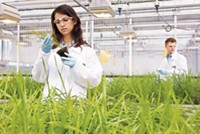Advertisement
Grab your lab coat. Let's get started
Welcome!
Welcome!
Create an account below to get 6 C&EN articles per month, receive newsletters and more - all free.
It seems this is your first time logging in online. Please enter the following information to continue.
As an ACS member you automatically get access to this site. All we need is few more details to create your reading experience.
Not you? Sign in with a different account.
Not you? Sign in with a different account.
ERROR 1
ERROR 1
ERROR 2
ERROR 2
ERROR 2
ERROR 2
ERROR 2
Password and Confirm password must match.
If you have an ACS member number, please enter it here so we can link this account to your membership. (optional)
ERROR 2
ACS values your privacy. By submitting your information, you are gaining access to C&EN and subscribing to our weekly newsletter. We use the information you provide to make your reading experience better, and we will never sell your data to third party members.
Business
Europe clears Dow-DuPont merger
DuPont to divest much of its pesticide business to satisfy competition concerns
by Melody M. Bomgardner
March 28, 2017
| A version of this story appeared in
Volume 95, Issue 14

The European Commission (EC), the governing body of the European Union, has given the green light for the $130 billion merger of Dow Chemical and DuPont to proceed. But the approval is contingent on major divestitures from DuPont’s pesticide business to preserve competition in the market.
DuPont will be required to sell its nine-herbicide portfolio of products used on cereals, rapeseed, sunflowers, rice, and pasture grass. And it will have to find a buyer for its insecticides that target chewing and sucking insects in fruits and vegetables, including its recent blockbusters Rynaxypyr and Cyazypyr. The sales will include manufacturing facilities and employees.
DuPont will also have to off-load almost all of its global R&D operations for pesticides, aside from those supporting businesses it is allowed to keep. The EC says it found evidence that combining R&D would have given the new company an incentive to discontinue some costly efforts to develop innovative products.
DuPont will keep seed treatments, nematicides, and late-stage R&D programs. And both companies will be able to keep their seeds businesses.
The EC says its goal is to ensure price competition, product choice, and future innovation in pesticide products. “Pesticides are products that matter—to farmers, consumers, and the environment. We need effective competition in this sector so companies are pushed to develop products that are ever safer for people and better for the environment,” says Margrethe Vestager, the EC commissioner in charge of competition policy.
Given the wave of consolidation sweeping the agriculture industry, it won’t be easy to find a buyer that doesn’t raise additional regulatory problems for market competition. Most likely out of the game are Bayer, which is buying Monsanto, and ChemChina, which is combining with Syngenta.
Much may hinge on BASF, the only major firm that is not already pursuing a big agriculture deal. In September, Markus Heldt, president of BASF’s crop protection division, told members of the media that the company is “actively pursuing opportunities arising from ongoing merger efforts to increase our footprint and value offer.”
The commission also flagged Dow’s and DuPont’s overlapping businesses in copolymers for packaging applications. Anticipating this objection, Dow already agreed to sell its Primacor ethylene acrylic acid copolymers business to South Korea’s SK Global Chemical.
After the divestments, the merged company will retain strong crop protection assets, Dow and DuPont contend. The firms maintain their estimate of $3 billion in annual operating savings from the merger and $1 billion in additional sales growth.
The divestments are likely to help the companies clear regulatory hurdles in the U.S., Australia, Brazil, Canada, Chile, China, and South Africa.







Join the conversation
Contact the reporter
Submit a Letter to the Editor for publication
Engage with us on Twitter